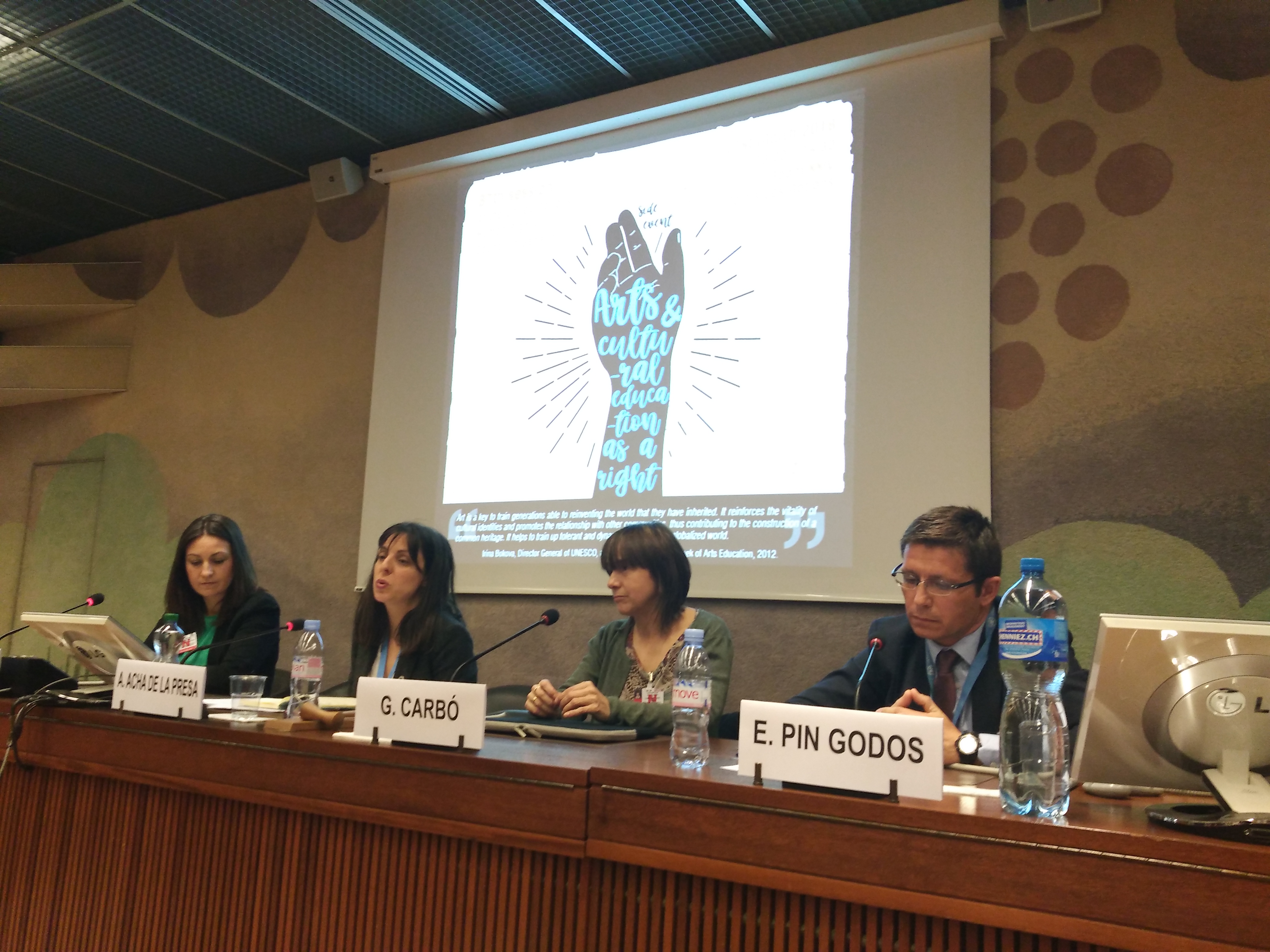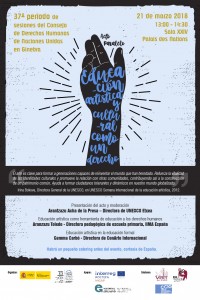
Arts education is a right of all, but even more importantly it is a right for all. It not only contributes to the full and integral development of students as direct beneficiaries, but it also produces a positive impact on society at large. Arts education is the ‘educational weapon’ that opens up the souls and allows emotions to flow, overcoming barriers and unifying us all as humankind. Last but not least, Arts education is a powerful tool for human rights education, without which the full and true respect of human rights, free of any discrimination, cannot be achieved.
Organized by UNESCO Extea (UNESCO Center Basque Country) and the Permanent Mission of Spain, the side event “Arts and Cultural Education as a Right”, took place on the 21st of March 2018 in conjunction with the 37th Session of the UN Human Rights Council. This event was organized with the support of Interreg POCTEFA – MIGAP (EU) and the Agencia Vasca de Cooperación para el Desarrollo, and was also co-sponsored by the International Catholic Center of Geneva (CCIG), the Instituto Internazionale Maria Ausiliatrice (IIMA), and International Volunteerism Organization for Women, Education, and Development (VIDES International). Ms. Arantzazu Acha de la Presa, Director of UNESCO Extea, moderated the event.
 During the last few years, international organizations have showed a growing interest in the role of culture and cultural expression diversity in the field of education aimed at social transformation. The first World Conference on Arts Education was held in Lisbon in 2006. The main outcome from the conference was the Road Map for Arts Education, a policy-guiding document aimed at raising awareness among all concerned stakeholders on the importance of Arts Education and its crucial role for improving the quality of education. Four years later, in 2010, a second edition of the World Conference on Arts Education took place in Seoul. In the Closing Session, the “Seoul Agenda: Goals for the Development of Arts Education” was presented which affirmed that arts education has an important role to play in the constructive transformation of educational systems. The Seoul Agenda calls upon UNESCO Member States, civil society, professional organizations and communities to realize the full potential of high quality arts education to positively renew educational systems, to achieve crucial social and cultural objectives, and ultimately to benefit children, youth and life-long learners of all ages.
During the last few years, international organizations have showed a growing interest in the role of culture and cultural expression diversity in the field of education aimed at social transformation. The first World Conference on Arts Education was held in Lisbon in 2006. The main outcome from the conference was the Road Map for Arts Education, a policy-guiding document aimed at raising awareness among all concerned stakeholders on the importance of Arts Education and its crucial role for improving the quality of education. Four years later, in 2010, a second edition of the World Conference on Arts Education took place in Seoul. In the Closing Session, the “Seoul Agenda: Goals for the Development of Arts Education” was presented which affirmed that arts education has an important role to play in the constructive transformation of educational systems. The Seoul Agenda calls upon UNESCO Member States, civil society, professional organizations and communities to realize the full potential of high quality arts education to positively renew educational systems, to achieve crucial social and cultural objectives, and ultimately to benefit children, youth and life-long learners of all ages.
Since 2011, UNESCO Etxea, together with the International Catholic Center of Geneva, has organized training sessions on the UN Human Rights Council and its mechanisms. The 2018 training also provided the occasion to organize the present side event.
The presentations by the speakers, Ms Arantzazu Acha de la Presa (Director of UNESCO Extea), Ms Gemma Carbó (Director of ConArte Internacional), Ms Aranzazu Toledo (Primary School Director – IIMA Spain), and Mr Emilio Pin Godós (Human Rights Adviser of the Permanent Mission of Spain), offered concrete inputs on how Arts Education can become a means for social transformation both in formal and informal education.
By bringing together members of civil society, experts and State representatives, this event created a space for dialogue and the sharing of information in order to identify the different ways of dealing with the issued identified.
To read the executive summary of the event, click here.